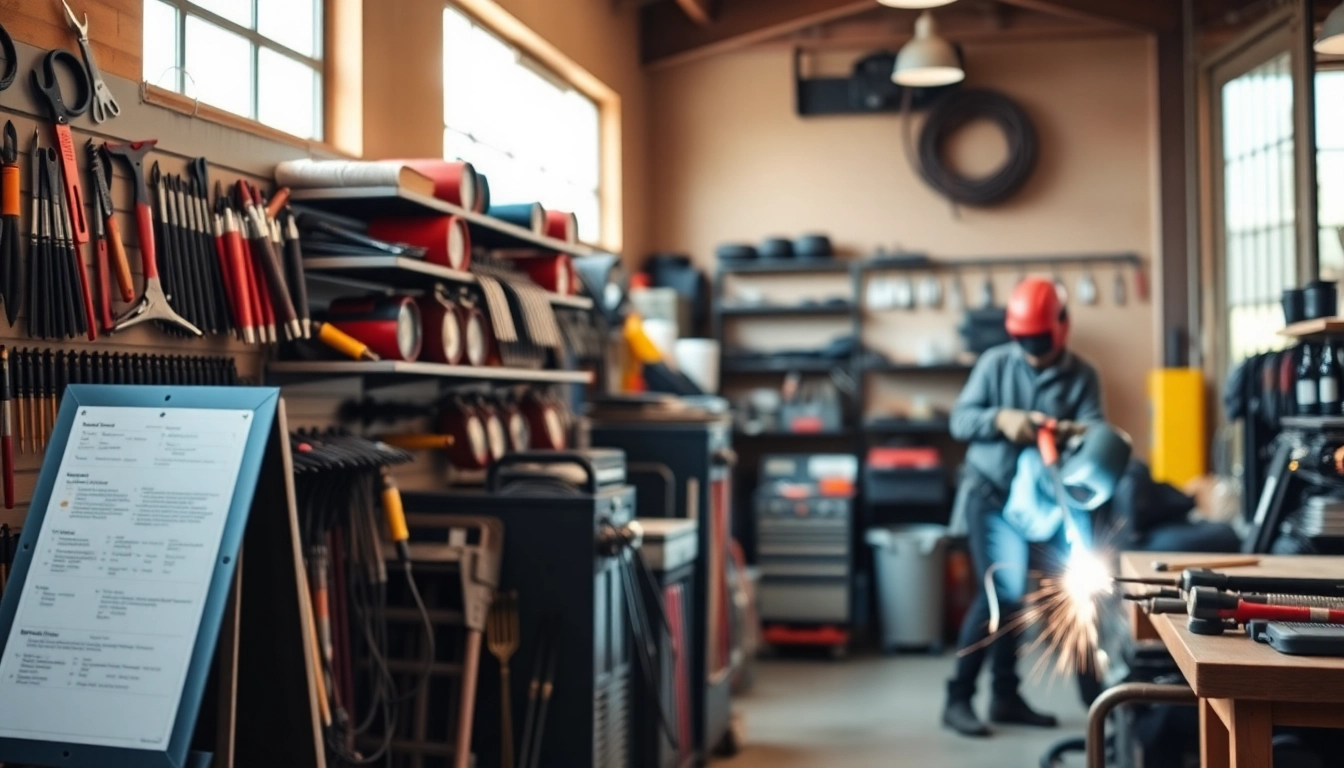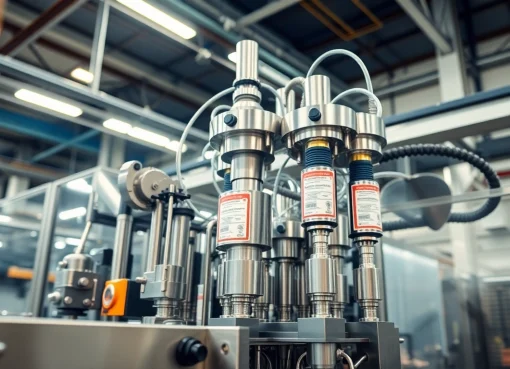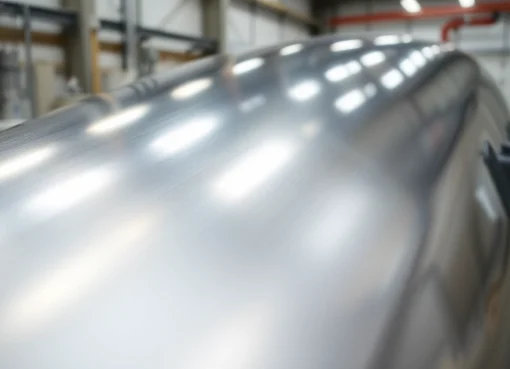Your Local Guide to Quality Welding Supplies Near Me for Every Project

Understanding Your Welding Needs
Welding is an indispensable skill in various industries—from automotive to construction, and beyond. Whether you’re a seasoned professional or an enthusiastic DIYer, understanding your specific welding needs can significantly enhance your efficiency and quality of work. The journey begins with selecting the right welding supplies. You may find yourself searching for welding supplies near me, but there’s much more to consider before you make that purchase.
Types of Welding Supplies Available
Welding supplies encompass a wide variety of tools, equipment, and materials. Depending on the type of welding you plan to undertake, the supplies you need will vary. Here’s a breakdown of common supplies:
- Welders: These machines range from arc welders to MIG (Metal Inert Gas) and TIG (Tungsten Inert Gas) welders. Each type has its specific applications and benefits.
- Electrodes and Filler Metals: These materials are used to create the weld itself. Selecting the right electrode is crucial for achieving a strong bond.
- Protective Gear: Safety should never be compromised. Gear includes helmets, gloves, aprons, and flame-resistant clothing.
- Welding Accessories: Tools like clamps, brushes, and grinders play a vital role in the welding process, ensuring efficiency and safety.
- Gas Cylinders: For MIG and TIG welding, gas cylinders (such as argon and acetylene) are essential for creating the correct welding environment.
Identifying the Right Equipment for Your Task
When selecting welding equipment, it’s important to evaluate the specific requirements of your project. Consider the following:
- Material Type: Different materials (steel, aluminum, etc.) require specific welding techniques and fillers.
- Thickness: Thicker materials may require a different amperage or voltage setting.
- Environment: Indoor vs. outdoor conditions affect the welding process, especially regarding wind and temperature.
Common Mistakes to Avoid When Choosing Supplies
Choosing the wrong welding supplies can lead to inadequate welds and safety hazards. Here are some common mistakes and how to avoid them:
- Ignoring Safety Gear: Always invest in high-quality protective equipment to shield yourself from burns or harmful fumes.
- Purchasing Based on Brand Alone: While brand reputation matters, it’s crucial to choose equipment suited for your specific needs.
- Overlooking Maintenance: Understand the maintenance requirements of your equipment to prolong its life and performance.
Where to Find Welding Supplies Near Me
When searching for “welding supplies near me,” the options can feel overwhelming. From local hardware stores to specialty retailers, knowing your choices can help you make an informed decision.
Local Hardware Stores and Their Offerings
Many local hardware stores offer a variety of welding supplies, ideal for quick pickups or last-minute needs. Notable stores include:
- The Home Depot: This store often has a range of welders and safety gear available for immediate pickup.
- Tractor Supply Co: Known for their extensive hardware inventory, they carry welding supplies including gas cylinders and welding equipment.
- Ace Hardware: A go-to for various DIY welding components, Ace Hardware provides a local option with convenient accessibility.
Online Retail Options for Convenient Shopping
For those who prefer online shopping, numerous websites offer a comprehensive selection of welding supplies. Online retailers often provide detailed descriptions and user reviews, helping you to make informed choices.
Examples include:
- Amazon: Provides an extensive array of welding supplies, catering to both beginners and professionals.
- Lowe’s: A reliable source for purchasing tools, welding machines, and safety apparel online.
- Welding Supply Specialists: Websites dedicated to welding often provide a broader selection of specific tools and equipment.
Specialty Welding Supply Companies to Consider
If you need specialized equipment or expert guidance, consider visiting specialty welding supply companies. These suppliers focus exclusively on welding products and often provide exceptional customer service. Notable examples include:
- Airgas: They offer a large variety of gases, welding tools, and safety equipment.
- Badger Welding Supplies: This company provides a wide range of welding tools and materials tailored for professionals.
- Great Lakes Welding Supply: Known for their exceptional customer service and comprehensive product range.
Comparing Prices and Quality of Supplies
When planning a welding project, evaluating the price and quality of supplies is crucial. Understanding where to invest your money can lead to better outcomes in your work and safety.
How to Evaluate Welding Supply Quality
Quality should be a top priority over cost, particularly for critical welding projects. Here’s how to evaluate the quality of welding supplies:
- Material Composition: Ensure that electrodes and filler metals are compatible with the base material and designed for your specific welding process.
- Certification and Standards: Look for products that meet industry standards (AWS, ISO) to ensure reliability and safety.
- User Reviews: Reading reviews from other welders can provide insight into the performance and durability of the products.
Price Comparison: Local vs. Online Options
Prices can vary significantly between local and online retailers. Typically, local hardware stores have higher prices due to shipping and store overhead. However, shopping online often offers deeper discounts or bundling options that can save you money. Perform thorough price comparisons before making a purchase.
Finding the Best Deals on Quality Supplies
Finding the right balance between quality and price is essential. Here are some strategies for locating the best deals:
- Shop Sales and Promotions: Keep an eye on seasonal sales, especially during holidays or customer events.
- Sign Up for Newsletters: Many retailers offer exclusive deals to subscribers of their newsletters.
- Bulk Purchasing: Buying in bulk can lead to significant savings, especially for consumables like electrodes.
Safety Equipment and Best Practices
Safety is paramount in any welding endeavor. Understanding the necessary safety equipment and best practices ensures a secure working environment.
Essential Safety Gear for Welders
Welders are exposed to various hazards including sparks, heat, and UV radiation. Protective gear includes:
- Welding Helmets: Choose helmets with auto-darkening lenses to protect your eyes from harmful light.
- Gloves: Heat-resistant gloves should be worn to protect hands from hot materials and sparks.
- Fr Clothing: Flame-resistant clothing protects the skin from extreme heat and spatter.
- Respirators: Depending on the materials you’re working with, respirators may be necessary to filter harmful fumes.
Maintaining a Safe Workspace
Setting up a safe workspace is crucial for reducing the risk of accidents:
- Organized Space: Keep your workspace organized to prevent tripping hazards and ensure efficient workflows.
- Proper Ventilation: Ensure that your workspace has adequate ventilation to prevent the buildup of harmful gases or fumes.
- Fire Safety: Have fire extinguishers readily available and know their locations.
Regulatory Standards and Compliance Overview
Compliance with local, state, and federal regulations is crucial for ensuring safety in welding practices:
- OSHA Guidelines: Familiarize yourself with the Occupational Safety and Health Administration (OSHA) standards that specifically relate to welding.
- Local Regulations: Always check for any local regulations that may apply to welding in your area.
- Regular Training: Ensure that all team members are trained in safety protocols and equipment use.
Staying Updated with Welding Trends and Techniques
The welding industry is continually evolving with new technologies and techniques. Staying updated can enhance your skills and improve project outcomes.
New Innovations in Welding Technology
Emerging technologies have changed the way welding is approached. Some notable advancements include:
- Automation: Robotic welding systems are becoming prevalent in manufacturing settings, improving precision and efficiency.
- Friction Stir Welding: A solid-state welding process that creates less thermal distortion, ideal for specific applications.
- 3D Printing with Welding: New techniques allowing for additive manufacturing that incorporates welding processes.
Training Resources and Workshops Near Me
Hands-on experience and continual learning are vital in the welding field. Look for workshops or training programs in your area:
- Community Colleges: Many offer courses on welding techniques and safety procedures.
- Trade Schools: Specialized welding programs can provide in-depth training and certifications.
- Online Courses: For flexible learning, consider online courses offered by recognized institutions.
Networking Opportunities in the Welding Community
Connecting with fellow welders can provide insights into best practices and emerging trends:
- Professional Associations: Joining organizations like the American Welding Society can provide networking opportunities and access to resources.
- Local Meetups: Look for welding groups or forums in your community to share experiences and learn from peers.
- Conferences and Trade Shows: Attending industry events can provide both educational and networking opportunities.



Leave a Comment